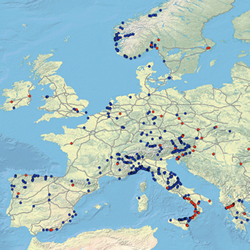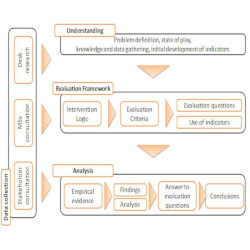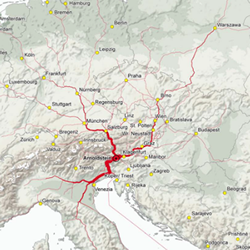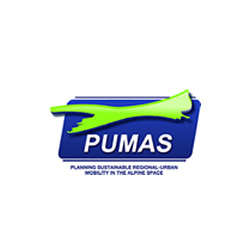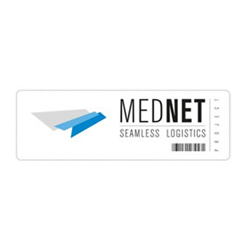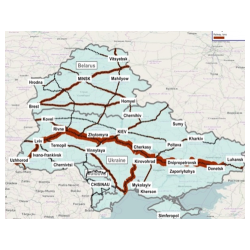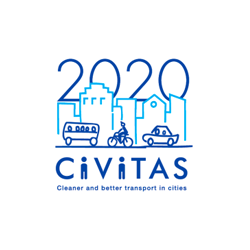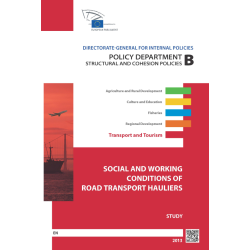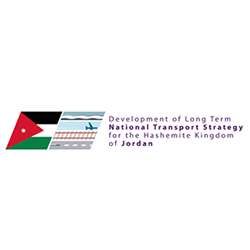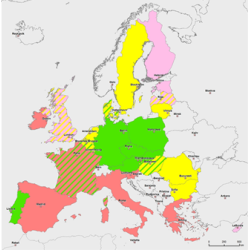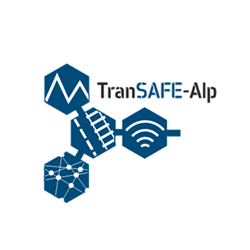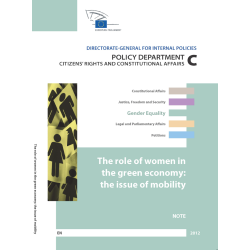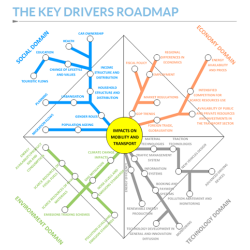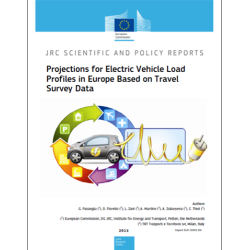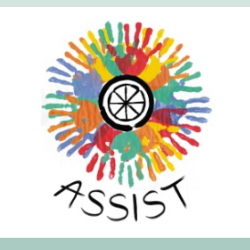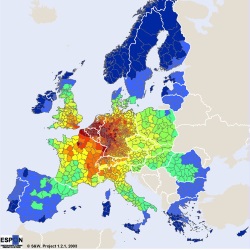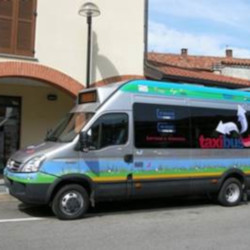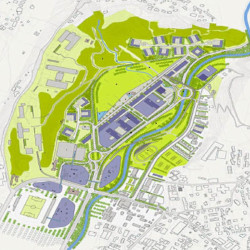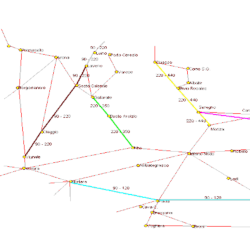- Study on the implementation and effects of Directive 2004/54/EC on minimum safety requirements for road tunnels in the trans-European road network The study assessed the state of implementation of the Directive 2004/54/EC and the state of the refurbishment works of the tunnels. The effects of the provisions on safety, environment and traffic were evaluated. The study also estimated the costs for the broadening of the scope of the Directive and collected best practices for the updating of its provisions.
- Study on the effectiveness and on the improvement of the EU legislative framework on road infrastructure safety management (Directive 2008/96/EC) The aim of the study was to assist the European Commission in the evaluation of Directive 2008/96 / EC on the management of road safety in all Member States and to examine possible changes in the light of new technological developments. Starting from a thorough survey with the national authorities, the study conducted: an ex post evaluation of the implementation of Directive 2008/96/EC by measuring the degree of implementation by Member States and the main impacts of its application on road safety; a preliminary analysis of the possible areas of improvement, in particular concerning the safety of pedestrians, cyclists and motorcyclists, vehicles and road infrastructures.
- Technical assistance related to public transport in the POLITE (POlicy Learning in Information Technologies for Public Transport Enhancement) project TRT supported the Province of Ferrara, partner of the POLITE project, in developing the following technical activities: analysis of ICT Best Practices in Local Public Transport, support in definition of ICT policies for Local Public Transport, technical expert support for sessions focused on transferring experiences, organization, management and participation at the training sessions of the project, technical expert support for implementation of measures at local level, development of effective planning tools for implementing best practices at local level.
- Milano-Brescia motorway (Brebemi) A joint project between private and public partners, Brebemi is the first motorway to be realised with project financing in Italy. As traffic consultant, TRT has been supporting BreBeMi since 1997 by taking care of all the project phases: from the pre-feasibility analysis until the last activities. Since the beginning, TRT provided technical support to the whole process: traffic demand analysis, revenue forecasts, economic and financial assessment. According to plans, the new motorway has been opened to traffic on July 2014.
- Development of a business plan, with main focus on the maritime freight traffic, concerning the activation of a new rail service connecting the Port of Venice (Italy) and Villach (Austria) The Venice Port Authority, partner of the Central Europe “Empiric” project, instructed TRT to develop a business plan, with main focus on the maritime freight traffic, concerning the activation of a new rail service between the Port of Venice and Villach. Objectives of the study were: analysing the market, detecting types and quantities of goods to be transported by new rail service as well as identify potential customers, identification of a possible MTO (Multimodal Transport Operator)interested in carry out the service and description of the possible logistics terminals that can be used, definition of a railway operation model with identification of usable infrastructure and slots as well as the frequency of the service and volume of freight, development of economic and financial analysis able to verify the pricing policies to be adopted for startup and maintenance of the service, the potential economic and financial resources in support of activities, the structural investments, the need for incentives for the implementation and maintenance of the service, implementation of an environmental balance analysis through the identification of appropriate environmental indicators.
- PUMAS – Planning Sustainable Regional Urban Mobility in the Alpine Space The PUMAS project is part of the wider territorial cooperation Programme “Alpine Space 2007-2013” which includes the Alpine region neighboring countries. PUMAS aims at testing and validating the methodology developed by the Eltis project (www.mobilityplans.eu) for the drafting of the sustainable mobility plans (SUMP). TRT provides technical assistance to the Venice Municipality, coordinator of the PUMAS project, by providing support in reporting, meeting and seminars organisation, communication and dissemination, drafting documents, evaluation and technical assistance to the seven pilot projects.
- Drafting of tender documents for the provision of urban Public Transport Services of city of Isernia TRT, within the procurement notice on the tender of the provision for urban public transport services, gave support to ATM Molise in the preparation of the technical offer. Activities were related to: territorial analysis, the reconnaissance of the status quo situation about the public transport (services and infrastructures), the identification of the network, lines and new stops, the construction of timetables and the calculation of service and accessibility indicators. Besides, the attention was focussed on the interventions to design the stops (platforms, poles, elimination of conflicts) and upgrade information to users (timetables, electronic displays, maps related to the urban mobility system).
- MEDNET – Mediterranean Network for custom procedures and simplification of clearance in ports – Work Package 4 Technical assistance to the Taranto Port Authority and to Rete Autostrade Mediterranee (RAM) for carrying out research activities within Work Package 4 of the MEDNET project. Main activities included: analysis of customs and security procedures applied in the various Italian ports, analysis of best practices and identification of improvement opportunities.
- TRACECA IDEA II – Transport dialogue and interoperability between the EU and its neighbouring countries and central Asian countries Funded by the Directorate General for Neighbouring of the European Commission within the framework of the TRACECA Programme (TRAnsport Corridor Europe Caucasus Asia), the IDEA II project aimed at improving the functioning of the transport corridor connecting Europe with Central Asia. The project activities focused in particular of the TRACECA countries belonging to the Eastern Partnership region (Georgia, Armenia, Azerbaijan, Ukraine and Moldova) and included the detailed analysis of the performance of the rail and road regional transport network in relation to the extension of the EU TEN-T network, the quantitative study of alternative scenarios for traffic at the year 2030 with the support of a transport model, the creation of the transport projects pipeline and prioritisation of those of regional interest, the creation of a web platform for e-learning, the calculation of benchmark indicators for road border-crossing points and ports and the study of the approximation of the aquis communautaire in the road and rail sectors legislation. The consortium led by TRT was composed of Panteia, Dornier and Lutsk University.
- CIVITAS WIKI – Coordination and support action for CIVITAS PLUS II CIVITAS WIKI is the Coordination and Support Action for CIVITAS PLUS II, promoting and demonstrating integrated sustainable urban transport strategies to tackle negative effects of road transport in urban areas. 8 European cities are involved testing, evaluating and disseminating about 50 innovative measures for sustainable urban mobility. CIVITAS WIKI focuses on good practice exchange and dissemination of results and promotion of the CIVITAS Initiative. As a whole offers support to the demonstration projects of CIVITAS Plus II on the implementation, evaluation and dissemination of measures. TRT is specifically involved in the management of the CIVITAS Thematic Groups, whose main objective is fostering knowledge transfer, dissemination of best practices and debate about innovative measures for sustainable urban mobility based on the CIVITAS experience.
- Study on the social and working conditions of road transport hauliers The study discussed the EU legislation relevant to social aspects and access to the market and profession regarding the road freight transport sector. Current social and working conditions of professional drivers were described with particular emphasis on issues such as: employment schemes, problems raised in the enforcement of the European legislation and quality of life. The study formulated recommendations intended to support the decision-making process of EU institutions for improving the social and working conditions of professional drivers.
- LivingRAIL – Living in a sustainable world focused on electrified rail The goal of the LivingRAIL project was to elaborate a vision of a sustainable transport system and society in 2050 where transport needs are overwhelmingly served by electrified rail The analytical work first separated rail transport specific visions of how the sector could perform by 2050 from a broader vision of how Europeans would live and work in 40 years time to eventually combine the two. The analytical work combined literature survey, statistical analyses and model applications with expert workshops, targeted interviews and scenario techniques.
- Study on the stated preferences regarding the use of car-sharing TRT has carried the study on the use of a new car-sharing service for the city of Milan on behalf of the Polytechnic of Milan . The stated preferences method is used to gather information on users’ choices in relation to hypothetical situations, which do not exist or are different from the reality. The survey method was then applied to measure the possible impact of a car-sharing service aimed at “residents” and “companies”. The activities included the identification of a sample (1,000 interviews), the definition of the survey questionnaire (distributed via web) and the processing of the results obtained. The questionnaire included several exercises of choice in hypothetical cases of use of the service, aimed at quantifying a series of behavioral parameters. The elaboration of the results was specifically carried out to quantify the parameters of the transport demand functions, concerning the disposition to share one’s car and to use the service.
- Development of Long Term National Transport Strategy for the Hashemite Kingdom of Jordan The overall objective of the project is the development of the Long-Term National Transport Strategy for Jordan and of an Action Plan for its implementation for the first 5 years. The Strategy has been delivered preparing a multi-modal implementation pipeline of transport projects, which included the feasibility analysis of five different scenarios of implementation, evaluated and prioritised through cost-benefit analysis methodology. A VISUM transport forecast model and an investment appraisal and prioritisation methodology were developed in order to provide quantitative input for the preparation of the Strategy. Capacity building activities of the staff of the Ministry of Transport complemented the project activities. [tw_sh_column][tw_sh_column_item item_animation=”none” item_animation_offset=”” column_size=”1 / 3″][/tw_sh_column_item][tw_sh_column_item item_animation=”none” item_animation_offset=”” column_size=”1 / 3″][/tw_sh_column_item][tw_sh_column_item item_animation=”none” item_animation_offset=”” column_size=”1 / 3″] [/tw_sh_column_item][/tw_sh_column]
- An ex-post evaluation of transport infrastructure charging policy: update of the external cost handbook and impact assessment of future legislative proposals The project is articulated in two stages. A first part of the project dealt with the ex-post assessment of the impacts deriving from the application of the “Eurovignette Directive” which sets the framework for road user charging policy at the European level. The second part of the project carried out an ex-ante impact assessment of the future legislative proposals for road infrastructure charging that will be presented to the European Parliament and the Council.
- Technical assistance to the TranSafe-Alp project TranSAFE-Alp project had the objective of improving the levels of safety and security on the Alpine road network and the management of emergencies, with the final aim of reducing fatalities caused by natural critical events and road accidents. The Veneto Region, the leading partner, commissioned TRT Trasporti e Territorio to provide technical assistance for supporting project management and to contribute with technical and scientific research in several related activities. TRT also developed a financial reporting tool, the identification of the technical requirements of the JITES tool and leaded the coordination of the evaluation activities conducted for assessing the project results.
- The role of women in the green economy – the issue of mobility TRT and IRS Istituto per la Ricerca Sociale have carried out a report on behalf of the European Parliament, Directorate General for Internal Policies of the European Union, which aims at highlighting the characteristics of gender mobility and in particular of women mobility. The study finds its justification from the European Community strategy towards the realization of equality between women and men (European Commission, Strategy for equality between women and men, 2010-2015) and in the Road Map in order to achieve the European targets 20-20-20 (European Parliament resolution of the 11 March 2008).
- Public Transport Plan: Varese Hospital TRT carried out the Public transport plan of Varese Hospital (about 1.900 workers). The objectives of the plan are: to promote the safety and sustainable access to the Hospital by foot and cycling, safer link between the centre of city and the hospital area; to optimize the use of the car, reducing car dependency for the hospital’s workers i.e. improving carpooling and car sharing solution; the definition of new parking lots regulation and pricing system for workers.
- COMPASS – Optimised Co-Modal Passenger Transport for ReducingCarbon Emissions The COMPASS project identified and analysed key trends that affect mobility patterns now and in the future to identify the needs of current and future travellers. The project also identified ICT and ITS-based solutions that have the potential to improve co-modality in passenger transport and assessed them through a number of case studies.
- Study to estimate electric vehicle load profiles for selected EU countries based on travel survey data This study was aimed at building a database of grid load profiles for electric vehicles in six European countries – France, Germany, Italy, Poland, Spain, UK – based on car driving patterns. Data on car driving patterns was collected by means of a sample survey involving 600 individuals in each country. Each participant filled in a on-line (CAWI) car driving diary for a period of seven days. The database allows to estimate individual charging profiles and then daily (24 hours) load profiles under assumptions on the share of electric vehicles in the fleet and on their technical features.
- Introduction of measures (including a bike sharing system) to promote cycling in eastern Lake Iseo area Comunità Montana Sebino Bresciano (Local Authority) and CARIPLO (Bank Foundation) promoted a feasibility study for the development of cycle-pedestrian mobility in the area located along the coastal side of the Iseo Lake (North of Italy). TRT produced the feasibility study focused on the design of a bike-sharing service, business model and regulation framework between local authority and transport operators.
- ASSIST – ASsessing the Social and economic Impacts of past and future Sustainable Transport policy in Europe The main objective of the ASSIST project (ASSessing the Social and economic Impacts of past and future Sustainable Transport policy in Europe) was to provide the EU with sound policy advice on the possible social and economic impacts of future sustainable transport policies that would contribute to the strategic objectives of the EU given by the Lisbon Strategy, the Sustainable Development Strategy and the EU-2020 strategy. The role of TRT concerned the modelling line, as leader of the development of the new tool in cooperation with the project leader Fraunhofer-ISI (Germany). Other partners are NEA (The Netherlands), ProgTrans (Switzerland), FŐMTERV (Hungary), CNRS-LET (France).
- Wide-area bicycle plan for the Northern part of the Milano province (Italy) The Municipality of Legnano leader of a group of 23 municipalities in the northern area of Milano, jointly with CARIPLO (Bank Foundation), selected TRT for the preparation of the cycling mobility plan for the North-Milano suburban area. Design of cycling network; Public transport and cycling connections; Cycling services for commuters and leisure users.
- The ESPON project TRACC (TRansport ACCessibility at regional/local scale and patterns in Europe) The ESPON project TRACC (TRansport ACCessibility at regional/local scale and patterns in Europe) aimed at updating the results of previous studies, extending the range and the spatial resolution of accessibility indicators in response to the most recent policy questions. The TRACC conceptual framework is based on a systematic and comprehensive theoretical consideration of the major dimensions of accessibility, as well as of the most frequently used types of accessibility indicators and extensions of these. TRACC developed a systematic and consistent set of accessibility indicators, differentiated according to three spatial contexts (global, European, regional) and also between travel and freight. At European level, accessibility indicators for travel are further distinguished between traditional and newer ones. At regional level, moreover, a new set of indicators is included focusing on the accessibility to services of general interest, which are among the top priorities in the current policy agenda.
- Parma Urban Mobility Plan TRT was responsible for updating of the Parma Urban Mobility Plan (also previously prepared by TRT in 2005 and adopted in 2006). The plan was an innovative tool as sustainability goals gave emphasis to a concept of mobility that introduced different measures and policies for different parts of the city: central area, the city of pedestrians and soft mobility;ù urban area, the city of the space shared between the soft mobility and the vehicular mobility; wide area, the city’s private and collective mobility
- Transport Assessment for the introduction of the Multi Lane Free Flow Toll System Project provided a detailed study on the electronic toll systems “free flow” implemented on several international highways and a description of benefits arising from the introduction of the toll system for the new highway Brebemi (Brescia-Bergamo-Milano). The analysis focused on: technological, operating characteristics, different control practices for non-payments and the legal aspects governing the motorway sector. The role and the power of the motorway concessionaire in reducing toll violations has been outlined.
- Dial-a-ride – Analysis of innovative services and software evaluation SAD Trasporto Pubblico Locale SpA commissioned TRT to conduct a benchmark analysis on the dial-a-ride services provided in Italy and Europe. The project had two major objectives: identify within the national context, the dial-a-ride service schemes potentially applicable to the Bassa Atesina area, in terms of territorial extension, population served and local morphology; supply the contractor with an evaluation tool of the software used in other applications, finalised to programme and manage dial-a-ride services.
- “Mediana” motorway TRT was commissioned by the Verona Province to carry out a technical-economic analysis on the provincial road “Mediana”, as a strategic axis connecting Verona to the southern area of the province. TRT estimated the current and the forecast traffic demand on the new road. TRT also contributed to develop the Financial Plan of the new infrastructure. TRT took into account the project financing process in order to give an overview of the financial state of the promoting company during the realisation and operational phases.
- Preparation of tender documents for the provision of Public Transport Services of the Molise Region (technical assistance) ATM Molise involved TRT in the support for the preparation of the technical offer of the tender for the provision of local (extra-urban) public transport services announced by the Molise Region. The technical assistance focussed on the verification and validation of the minimum services programme, the definition of the optimised services (technical proposal), the estimation of quantitative indicators needed to evaluate the proposal and the preparation of draft of the technical documents, as part of Envelop B (Technical Offer).
- Urban and extra-urban services in the area surrounding Piacenza: survey on the transport demand TRT has been commissioned by Tempi Agenzia SpA to conduct a survey on the transport demand of urban and extra-urban services of the province of Piacenza. The study focussed on: design of the survey on the transport demand (get on/off of users, tickets, frequency of use, change with extra-urban transport and train services); preparation shift changes and instructions of the survey’s staff; Collection and elaboration of data. The data collected during the survey allowed to obtain a database on: users getting on/off per stop and line, origin and destination of the passengers and use of tickets and season tickets
- Logistics Between Southern Italy and China The Ministry of Economic Development – Department for Development Policies has commissioned a study to TRT to: identify market factors that may promote the Southern Italy as a logistics platform for the traffic generated from the Italian, European and Mediterranean market to the Far East. The aim of the study was to identify and prioritise investments and measures to boost the international exchanges of goods and the demand for logistics in the South of Italy. Two were the main objectives of the study: to point out the key factors which could support the development of Southern Italy as logistics platform for the exchanges with East Asia; to show the economics and territorial advantages coming from the logistics growth, in particular for the employment and the productivity. The analysis undertaken highlighted the economic benefits arising from the development of the territory logistics, with special reference to employment and productivity. The priority systems on which to focus were three. Gioia Tauro transhipment port, that offers great potential to local economy; Campania logistics system, with Salerno and Napoli ports and the logistics platforms of Nola and Marcianise; Taranto port, with the significant development recorded thanks to big shipping lines. The projects reviewed included the enlargement of the terminal container and the building up of an inland logistics platform.
- Eastern bypass of Brescia The study analysed different options of the alignment of a link with features of a motorway, in the eastern territory of Brescia. TRT coordinated the whole project. Notably, TRT developed the traffic simulation model in reference solution and project scenarios and carried out both cost-benefit and financial analyses.
- Company transport plan of Italcementi TRT has been charged by Italcementi SpA to set the job-home transfers plan for the 900 employees of the three offices placed in Bergamo (IT). The objectives of the plan are: to reduce the need of parking area available for Italcementi employees; to optimize car use for job-home transfers, through the promotion of the car pooling system; to favour the access to the offices, making the bicycle paths and pedestrian crossings safe.
- NQC Masterplan – New Cornaredo District After an international competition (first place), TRT was commissioned to design the mobility aspects of the new Cornaredo district entrance in Lugano (Switzerland) and evaluate the road traffic generated by the planned land use. The project was composed of 3 main phases: The contest (won) (2005); The Master Plan (2006); The Town Planning Scheme (2007). During the various stages, TRT activities concerned: the definition and functional assessment of connection between local and the main urban road system; the definition functional assessment of local road system for district’s traffic distribution. Definition of cycling and pedestrian paths to connect the new district and the green areas; Definition, measuring and management of parking lots and parking facilities at the end-station of public transports (Park&Ride); The translation of planning choices in regulations in the Traffic Plan, by means of a Mobility Index, i.e. the maximum number of peak hour trips allowable per unit of building area.
- Economic analysis of investments in rail nodes – The case study of the node of Milan The study was commissioned to develop and apply a simplified methodology for the economic analysis of major rail infrastructure projects, when to improving rail nodes. The methodology conceived focussed on the trade off between investment cost savings of network capacity and social costs generated by the road traffic diverted due to the missing capacity (in terms of congestion and environmental effects). The methodology and evaluation procedures were tested to appraise several scenarios of interventions, within the rail node of Milan and including the adjacent regional rail network.

